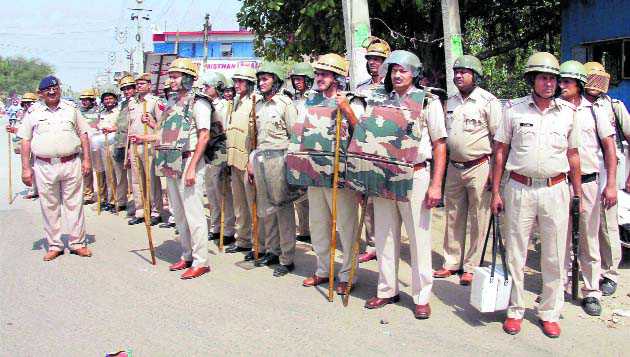Anil Chowdhry
It suits the political masters to keep the police under their tutelage and often misuse it to sub-serve their vested interests. The ordinary citizen is the sufferer.

BYSTANDERS: The ineffective role of the police during the Jat agitation in Haryana was manifestation of the breakdown of a healthy relationship between the political and police leadership. PTI
Safety and security of citizen’s lives and properties, and maintenance of law and order, the basis of police forces the world over, has unfortunately taken a back seat in India. It lies deeply buried in our colonial past and unwillingness of the political and bureaucratic leadership of free India to make the police a service to its citizens, as agents of the law.There are clear and repeated indications that law and order is being allowed to be breached and criminal depredations continue with impunity in some parts of our country. Rioting by a cult mob in Mathura — which took a toll of 29 lives, including two police bravehearts — and the mayhem witnessed for almost 10 days earlier this year in large parts of Haryana are pointers to the dark alleys through which law and order in our country is traversing.The focus of policing created by British rulers vide the Indian Police Act of 1861, coming in the wake of the 1857 uprising, was unsurprisingly to defend their newly imposed (1858) sovereignty against public unrest. The British encouraged Indian police officers to create rutba, a Persian term denoting aura of power, which helped in maintenance of peace. This rutba naturally began diminishing after Independence and has almost disappeared now. Post Independence, it suits our political masters to keep the police under their tutelage and often misuse it to sub-serve their vested interests. The ordinary citizen consequently is the sufferer. But who cares.The Prakash Singh Committee Report pointing to the total collapse of policing and mobs being allowed to indulge in wanton looting and arson in Haryana are indeed shocking. Dereliction of duty and even connivance of certain police officers with the rioters brought out by the report are areas of serious concern and deserve to be taken note of by the highest levels in the government. But will such incidents arouse public ire to the extent of forcing the political masters to put policing in our country back on the rails?The report has generated considerable debate within the police fraternity. Questions are being asked as to how did our policing sink to such depths? Why are police leaders not able to stand up to their political masters politely but firmly? They just have to convey the message that there shall be zero tolerance to those taking the law into their hands. The government too must respond by demonstrating that in the police hierarchy only merit and integrity, and not political loyalty, shall count. But will this happen is another moot point?That the police forces need to be reformed is universally acknowledged but they till this day continue to function by and large under the same archaic law of 1861.Even the directions of the apex court have not been acted upon by most state governments. Debates on the need to reform the police continue. But we are nowhere near the complete overhaul that the policing system requires.Who will do the clean-up? Most of my former colleagues, and many still in service, have become cynical, and throw up their hands in despair.We have faltered in ensuring delivery of police services to our law-abiding citizens. The strength of our civil police has failed to keep pace with the rapid rise in our population. On the other hand, our limited resources have been spent on mindless proliferation of paramilitary police, both Central and state. Manpower of our thanas and police outposts, which are charged with the basic responsibility of prevention and detection of crime and maintenance of peace in their jurisdiction, is totally inadequate. Our citizen-to-policeman ratio as compared to even other developing countries is poor.Multi-tiered recruitments at the level of constables, head constables, sub-inspectors, DSPs and IPS is another fault-line in Indian policing where correction is long overdue. Add to this the poor pay and working conditions of the subordinate police officers who are the cutting edge of our policing and the level at which maximum interaction with citizens takes place.The quality of policemen thus appears appalling, particularly to the higher-income citizens who frequently travel abroad and compare their local beat constable with the London Bobby. Little do they realise that in the wake of a strike by policemen in 1980 and based on the recommendations of a commission on police reforms, the police is the highest paid civil service in the UK and recruitment is only at one level—as constables.The communication between the higher ranks in the Indian police and their subordinates, which was earlier meticulously kept alive via thana inspections, weekly parades in the police lines, visits to living quarters of the constabulary and orderly rooms by district police chiefs, have all broken down under the weight of heavy day-to-day pressures from political masters. Field police officers are being kept occupied in unwarranted meetings and VIP security duties. All this has cost policing benefits to the average citizens dearly and created a severe trust deficit between the police and the people.The writer is former Secretary (Internal Security), Ministry of Home Affairs.
